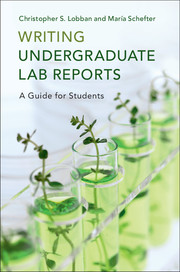Refine listing
Actions for selected content:
861 results in Ebooks for the Good Student

Writing Undergraduate Lab Reports
- A Guide for Students
-
- Published online:
- 31 July 2017
- Print publication:
- 27 July 2017
Part III - Crafting the Final Version
-
- Book:
- Writing Undergraduate Lab Reports
- Published online:
- 31 July 2017
- Print publication:
- 27 July 2017, pp 47-62
-
- Chapter
- Export citation
Dedication
-
- Book:
- Writing Undergraduate Lab Reports
- Published online:
- 31 July 2017
- Print publication:
- 27 July 2017, pp v-vi
-
- Chapter
- Export citation
Part I - Introduction
-
- Book:
- Writing Undergraduate Lab Reports
- Published online:
- 31 July 2017
- Print publication:
- 27 July 2017, pp 1-10
-
- Chapter
- Export citation
5 - Results
- from Part II - Writing the First DraftFormat
-
- Book:
- Writing Undergraduate Lab Reports
- Published online:
- 31 July 2017
- Print publication:
- 27 July 2017, pp 31-35
-
- Chapter
- Export citation
Further Reading
-
- Book:
- Writing Undergraduate Lab Reports
- Published online:
- 31 July 2017
- Print publication:
- 27 July 2017, pp 85-85
-
- Chapter
- Export citation
Part II - Writing the First DraftFormat
-
- Book:
- Writing Undergraduate Lab Reports
- Published online:
- 31 July 2017
- Print publication:
- 27 July 2017, pp 11-46
-
- Chapter
- Export citation
7 - Title and Abstract
- from Part II - Writing the First DraftFormat
-
- Book:
- Writing Undergraduate Lab Reports
- Published online:
- 31 July 2017
- Print publication:
- 27 July 2017, pp 42-46
-
- Chapter
- Export citation
10 - Transitioning to Writing about Original Research
- from Part IV - The Anatomy of Scientific Papers
-
- Book:
- Writing Undergraduate Lab Reports
- Published online:
- 31 July 2017
- Print publication:
- 27 July 2017, pp 65-82
-
- Chapter
- Export citation
2 - Starting to Write
- from Part II - Writing the First DraftFormat
-
- Book:
- Writing Undergraduate Lab Reports
- Published online:
- 31 July 2017
- Print publication:
- 27 July 2017, pp 13-16
-
- Chapter
- Export citation
Copyright page
-
- Book:
- Writing Undergraduate Lab Reports
- Published online:
- 31 July 2017
- Print publication:
- 27 July 2017, pp iv-iv
-
- Chapter
- Export citation
9 - References
- from Part III - Crafting the Final Version
-
- Book:
- Writing Undergraduate Lab Reports
- Published online:
- 31 July 2017
- Print publication:
- 27 July 2017, pp 58-62
-
- Chapter
- Export citation
References
-
- Book:
- Writing Undergraduate Lab Reports
- Published online:
- 31 July 2017
- Print publication:
- 27 July 2017, pp 83-84
-
- Chapter
- Export citation
To the Student
-
- Book:
- Writing Undergraduate Lab Reports
- Published online:
- 31 July 2017
- Print publication:
- 27 July 2017, pp ix-x
-
- Chapter
- Export citation
Acknowledgments
-
- Book:
- Writing Undergraduate Lab Reports
- Published online:
- 31 July 2017
- Print publication:
- 27 July 2017, pp viii-viii
-
- Chapter
- Export citation
4 - Materials and Methods
- from Part II - Writing the First DraftFormat
-
- Book:
- Writing Undergraduate Lab Reports
- Published online:
- 31 July 2017
- Print publication:
- 27 July 2017, pp 26-30
-
- Chapter
- Export citation
8 - Revising Your Paper
- from Part III - Crafting the Final Version
-
- Book:
- Writing Undergraduate Lab Reports
- Published online:
- 31 July 2017
- Print publication:
- 27 July 2017, pp 49-57
-
- Chapter
- Export citation
Index
-
- Book:
- Writing Undergraduate Lab Reports
- Published online:
- 31 July 2017
- Print publication:
- 27 July 2017, pp 86-86
-
- Chapter
- Export citation
6 - Discussion
- from Part II - Writing the First DraftFormat
-
- Book:
- Writing Undergraduate Lab Reports
- Published online:
- 31 July 2017
- Print publication:
- 27 July 2017, pp 36-41
-
- Chapter
- Export citation
3 - Introduction
- from Part II - Writing the First DraftFormat
-
- Book:
- Writing Undergraduate Lab Reports
- Published online:
- 31 July 2017
- Print publication:
- 27 July 2017, pp 17-25
-
- Chapter
- Export citation
